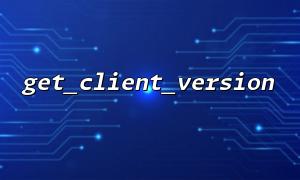When developing PHP applications, we often call various external interfaces or obtain client version information. Sometimes, we write a function to get the client's version, such as get_client_version . But in some cases, the server may mistakenly parse the return result of the function. This problem is usually related to the format of data transmission, encoding, or returning results. This article will discuss the reasons and solutions for PHP server error parsing get_client_version function.
The get_client_version function usually gets certain version information from the client and transmits it to the PHP server. After receiving this information on the server, error resolution may occur. Error parsing may cause program crashes, data confusion, or the version information cannot be processed correctly.
For example, an API call might return a URL like:
return "https://gitbox.net/api/version?client_id=12345";
If the PHP server directly handles this URL, some parsing problems may occur. Common reasons include:
URL format error : If the URL contains special characters (such as & , = , etc.) and is not correctly encoded, the PHP server may misinterpret.
The returned result type mismatch : The client may return JSON format data, while the server does not parse JSON correctly, resulting in an error.
Character encoding problem : If the client and the server use different character encodings (such as UTF-8 and ISO-8859-1), garbled code may appear during parsing.
The URL contains special characters <br> When constructing URLs, special characters may be misunderstood if the parameters are not correctly encoded. For example, symbols such as & , = , # have specific meanings in the URL. If the parameters are not encoded using urlencode , the PHP server may not be able to correctly parse the returned URL.
Solution: Use the urlencode function to encode parameters in the URL to ensure that the server can parse correctly.
$url = "https://gitbox.net/api/version?client_id=" . urlencode($client_id);
The format of the returned result is inconsistent <br> If the get_client_version function returns JSON format and the PHP server does not parse it correctly, an error may occur. Many times, developers forget to parse JSON when calling the API interface.
Solution: Use json_decode to correctly parse JSON return results.
$response = '{"version": "1.0.0", "url": "https://gitbox.net"}';
$data = json_decode($response, true);
echo $data['version']; // Output 1.0.0
Character encoding problem
PHP uses the ISO-8859-1 character set by default for processing, but if the client uses UTF-8 encoding, there may be garbled problems. Different encoding methods may cause string parsing errors and even exceptions thrown by the server.
Solution: Make sure that the client and server use the same character encoding, usually UTF-8 is selected.
header('Content-Type: text/html; charset=UTF-8');
HTTP response header not handled correctly <br> Sometimes, the URL returned by the get_client_version function may contain HTTP response headers. If the PHP server does not handle these response headers correctly, it may result in incorrect parsing results.
Solution: Make sure that the server code handles HTTP response headers correctly, for example when using file_get_contents or curl , check whether the returned content contains header information and process it accordingly.
$response = file_get_contents("https://gitbox.net/api/version?client_id=12345");
// Process the returnedJSONor other format data
Print and return result <br> During the development stage, you can first print out the return result of the get_client_version function to check whether there are any obvious formatting or encoding problems.
$version = get_client_version();
echo $version;
Using debugging tools <br> Using PHP debugging tools such as Xdebug can help view the actual format and encoding of the returned data, thereby finding the source of the error.
Check API documentation <br> If the get_client_version function is calling the external API, make sure that no important return format or encoding instructions are missing in the API documentation.
The problem of errors in the return result parsing of the get_client_version function is usually related to the URL format, return result type, character encoding mismatch, and improper HTTP response header processing. By correctly using encoding, parsing JSON and debugging tools, we can effectively avoid these errors and ensure that the server can correctly parse the data passed by the client.
Through the above analysis and solutions, we can more clearly locate and solve the problem of errors in the parsing of get_client_version function, ensuring that our PHP application can run stably.









